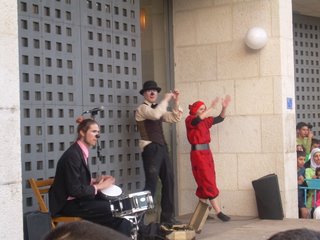Qatf az-Zeitun

The one on the left bears an uncanny resemblance to a friend of mine from Egypt (not an Egyptian friend). When he took off his nose it was even eerier.
So the olive-picking (qatf az-zeitun) thing is pretty big here. It's an age-old tradition which now has come to symbolize Palestinian heritage and nationalism, especially since so much land that was once used to harvest olives has now been taken by Israeli settlements, and the resource is slowly disappearing. I went with some of the boys from the village to Sa'eer, a small town south of Hebron where the school director's family owns over 200 dunums of empty, olive tree land. The trip was a day-long process. I didn't realize it at the time, but we brought a camping stove, a tea set, ingredients for tea and coffee, an arguila (sheesha, hookah. etc.) and enough food to last us a week should we need it. We had only been picking olives for about 1/2 hour before the men retired to a clearing up the hill and smoked and sipped coffee and chatted while we scrambled around on the tarps picking up olives. The more conservative women with us, who were wearing full hijab, hiked up their dresses and tied them around their waists, creating big sacks into which they pitched their pickings - they had it figured out. Compared to them, I felt about as efficient as the six-year olds (thats becoming a trend for me) who were meticulously filling up little plastic cups before dumping them into the big sacks, ultimately dropping half of their findings in the process. By the end of the day we collected two and a half huge sacks (three feet tall) of olives, loaded them into the car, and headed home just as dark clouds started to roll in, casting their grim shadows across the landscape.

It's beeing raining on and off here for the past two days. It's beautiful. Every morning smells like that first spring rain, the scent of rainwater mixing with dust and grass and slowly rising from the pavement. The rain is interupted by brief periods of bright sun, during which the children all emerge from their houses and play briefly before the next cloud moves in. When it started on Friday night, I was eating dinner in a house only about 20 meters from my room, but the children insisted that I spend the night there - they couldn't conceive of me walking home in what to them seemed like terrential rain. It's difficult to explain here why I love the rain so much - it reminds me of being at home. I kept my windows open last night, despite the chilly air, and let the sound of raindrops on the patio lull me to sleep.
